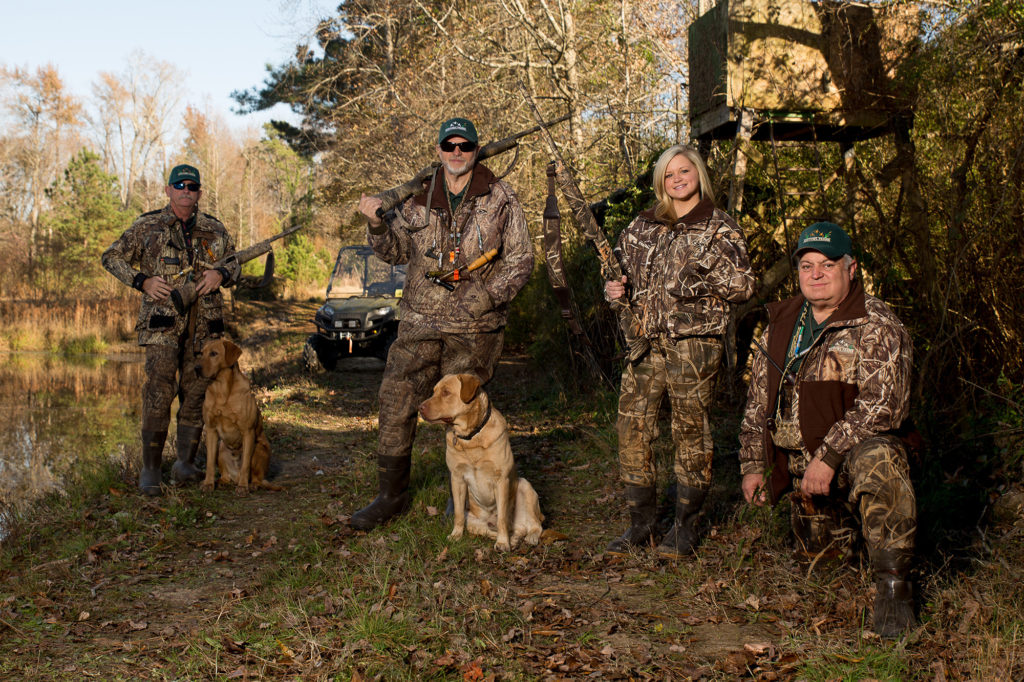
Paul White was dying of cancer and wanted to go duck hunting with his grown sons one last time in the North Carolina woods. But the local forecast at H2O Fowl Farms called for snow, and the sons called the hunting preserve worried they’d have to cancel.
“They said, ‘My dad was looking forward to this. How can we make this happen?’ ” said Holly Howard, a volunteer at the preserve and shooting range.
Andy Howard, Holly’s father and owner of H2O Fowl Farms in Dunn, knew what to do. He placed heaters in the duck blind closest to the hunting shack, a small lodge with a stove. He also made sure that a volunteer certified in CPR was on hand.
“It was snowing… it couldn’t have been a prettier day,” said Andy Howard, a purchasing agent at South River EMC, also in Dunn. “We sat around a wood stove for a while, and he and his sons reminisced about time gone by. Everyone was crying at the end, even us.”
The Howards have witnessed many poignant moments like the White family hunt—White died several months later—since H2O Fowl Farms opened 12 years ago.
“We love these special hunts. We don’t seek out these opportunities, but if they’re there, we embrace it,” said Holly, 23, a nursing student at Duke University who still volunteers at the farm on weekends.
Outdoors and wildlife have been lifelong passions for the Howard family. When son Drew was a high school senior, he raised ducks for a high school FFA project. What began as a shipment of 20 mallards has grown into a 118-acre hunting preserve teeming with about 1,200 ducks.
“It got a little bit bigger and a little bit bigger. My dad gets the credit,” said Drew, now 28 and a homebuilder in Raleigh. He’s not as involved in operations these days, but helps out when he can.
“It’s getting back to basics and getting back to nature,” said Drew. “It’s not about the hunt. If you don’t get anything, that’s OK. I really look forward to our times together. Hunting and the outdoors probably means more to me now than back in the day.”
It’s a full-fledged operation for anyone wanting to hunt but lacking waders, decoys and other gear. Don’t feel like splashing into the farm’s pond to retrieve fowl? The Howards’ three Labs and three English pointers are at your service.
“Hunting is an expensive hobby, and people don’t have hundreds of acres at their disposal,” said Holly. “If you just want to try it out and don’t want to put all this time and money into it … we do it for them.”
While guided upland game and water fowl hunts continue to be mainstays, in 2012, Andy Howard opened pistol and rifle pits for recreational shooting and to non-profit groups for classes.
And that’s when H2O Fowl Farms stepped up efforts to give back to the community.When law enforcement agency and military sharpshooters aren’t using the ranges, the farm donates time and space to 4-H clubs and the Triton High School shooting team. In addition, charitable shooting matches have raised $3,000 for wounded warriors groups over the past four years.
The business breaks even and Howard works 16-hour days, which includes his co-op job. Family members and volunteers help run the guided weekend hunts during the October-March season. In the words of a family member: “It’s a hobby and a job.”
“My dad makes notes about the hunters … their ages, how many in the group and whether they’re bringing dogs,” said Holly. “I’m in charge of organizing and making sure they have all the amenities they need. I really enjoy the relationship aspect.”
The payoff comes from the human connections built during the thrill of the hunt and the quiet moments around the campfire. Once, a group of Boy Scouts and wounded warriors were at the preserve at the same time. During the end-of-hunt campfire, the youngsters peppered the older hunters about their military experiences.
And then there’s the case of the brother and sister whose electric lineman father died on the job. Working with a local non-profit, Hunters Helping Kids, and a group of lineworkers, the farm sponsored a hunt. For the siblings, it was the first time they had been hunting since the loss of their favorite hunting buddy.
“The satisfaction and smiles on people’s faces keeps us doing it,” said Andy Howard.
Victoria Rocha is a staff writer at NRECA.